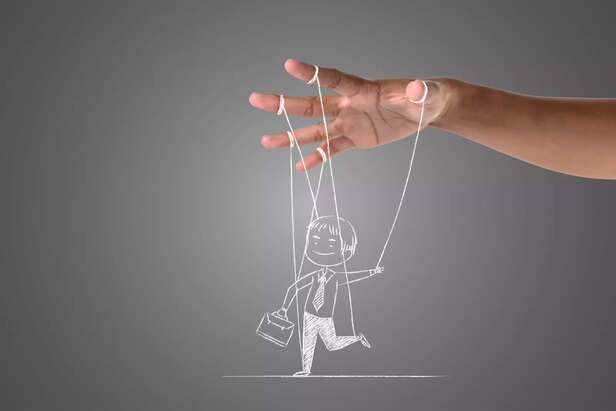Stop Overplaying Your Role: Deal People as They Deal with You Barely, Hardly and Accordingly
Amritansh Nayak | Jul 23, 2025, 23:50 IST
( Image credit : Freepik )
The emotional cost of overextending oneself in unequal relationships. It investigates the characteristics of asymmetrical effort, the significance of setting healthy limits without guilt, and the usefulness of reciprocal energy. Finally, it encourages readers to protect their emotional well-being by matching effort, practicing detachment, and selecting relationships based on mutual respect.
In a world where emotional labor is frequently overlooked, many people become overly committed to relationships that do not reciprocate. Whether with friends, family, or coworkers, we sometimes give more time, support, and energy than we receive, hoping that the effort will foster connection. However, when that effort goes unappreciated or unrewarded, it can lead to emotional exhaustion and bitterness. This essay delves into why we tend to overplay our roles, how to identify imbalanced interactions, and, most importantly, how to regain our peace by setting limits and accepting the power of reciprocity.

Many people fall into the trap of giving more than they receive in relationships—whether with friends, family, or coworkers. We often go above and beyond because we want to be liked, appreciated, or respected, expecting that our efforts will be noticed and returned. But what happens if they are not? This imbalance leads to emotional exhaustion. You may find yourself continuously available to others, checking in, helping them at their lows, or showing up even when you're exhausted—only to discover that the same energy isn't returned. One-sided interactions gradually erode your self-esteem and peace of mind, prompting you to question your role and relevance in the lives of others.
Overplaying your role in someone else's life frequently carries silent expectations—that your kindness will be remembered, that your sacrifices will be reciprocated. When these expectations are not realized, it causes dissatisfaction, exhaustion, and disappointment. The truth is that consistently overextending yourself does not increase your value; instead, it causes others to take you for granted. Learning to notice this tendency is the first step towards transformation. You don't have to equal everyone's energy, but you should protect your own. Giving should never be at the expense of oneself.

In every relationship, balance is essential. When you find yourself constantly starting discussions, arranging plans, or offering support while the other person seldom reciprocates, you're most likely engaged in an unbalanced effort loop. This imbalance may not be obvious at first glance—it frequently hides behind excuses, hectic schedules, or ambiguous responses. But, with time, the emotional burden of doing more than the other person becomes apparent. One of the most obvious indications is feeling depleted after each contact or wondering if your presence is really important to them. You begin to question whether you are truly valued or simply being used.
When your regular compassion is unrecognized or unnoticed, it can quickly grow into subtle bitterness. What starts as care can turn into self-neglect, especially if you keep giving from an empty cup. It's critical to recognize the distinction between healthy separation and passive aggression. Healthy detachment entails abandoning pursuit of people who put forth little effort, without harboring resentment or engaging in mind games. Simply draw back your energy and aim it toward those who value it. Recognizing these indications does not imply that you care less; rather, it demonstrates that you have learnt to care intelligently. Your efforts should be considered a gift rather than an expectation or burden.

Setting boundaries isn't about being cold or aloof; it's about directing your energies and maintaining your tranquility. Many people feel terrible when they stop giving too much or start saying "no," especially if their identity is based on being available, helpful, or emotionally generous. But the truth is that not everyone deserves your full attention and energy. Matching effort for effort is an effective way to avoid emotional drain. If someone only checks in on occasion, you do not need to continuously initiate. If someone doesn't show up when you need them, stop overextending yourself to be there for them all the time. This is not vengeance; it is self-respect. Adjusting your energy to match theirs is a subtle, mature boundary.
Respecting your time, energy, and value entails understanding that your availability is a luxury, not a right. Begin by pausing before answering "yes" out of habit. Ask yourself: Is this within my emotional budget right now? Some practical techniques to safeguard your bandwidth include minimizing communication with depleting people, setting aside quiet time for yourself, and not explaining every barrier you establish. You are free to step back without apologizing. Boundaries are not selfish; rather, they are a kind of self-care and emotional survival.

Reciprocity is the foundation of all healthy relationships. When effort is reciprocated—when support, attention, and care are given and received—trust deepens and ties strengthen. Balanced relationships thrive when both partners feel noticed, appreciated, and respected. No one is always pouring while the other only receives. The key is to learn to mirror someone else's effort rather than overcompensating for their lack thereof. You do not need to pursue someone who texts you on occasion. If they regularly cancel, cease altering your schedule to accommodate them. Mirroring isn't a game; it's about respecting emotional balance.
It safeguards your self-esteem while allowing others to demonstrate how much they truly care. Letting rid of one-sided friendships is difficult, but vital. People who simply take—your time, kindness, and energy—without reciprocating cause emotional imbalances that gradually wear you down. It's not about punishing others; it's about selecting yourself. Reciprocity is not a transaction; it is an expression of mutual respect. When you stop over giving and start matching energy, you create space for authentic, healthy relationships based on equal caring. That's not cold; it's clarity. And insight brings tranquility.
This all sum up with
You do not have to stop caring; you simply need to care more wisely. Relationships should enrich rather than empty you. Recognizing asymmetry, setting boundaries without guilt, and embracing reciprocity allow you to develop inner peace and self-esteem. When you let go of one-sided relationships, you will make room for mutual, meaningful, and emotionally balanced partnerships. Protect your energy—it is one of the most valuable assets you own.
Explore the latest trends and tips in Health & Fitness, Spiritual, Travel, Life Hacks, Trending, Fashion & Beauty, and Relationships at Times Life!
1. The Trap of Overextending Yourself

Too Much Effort, Too Little Return
( Image credit : Freepik )
Many people fall into the trap of giving more than they receive in relationships—whether with friends, family, or coworkers. We often go above and beyond because we want to be liked, appreciated, or respected, expecting that our efforts will be noticed and returned. But what happens if they are not? This imbalance leads to emotional exhaustion. You may find yourself continuously available to others, checking in, helping them at their lows, or showing up even when you're exhausted—only to discover that the same energy isn't returned. One-sided interactions gradually erode your self-esteem and peace of mind, prompting you to question your role and relevance in the lives of others.
Overplaying your role in someone else's life frequently carries silent expectations—that your kindness will be remembered, that your sacrifices will be reciprocated. When these expectations are not realized, it causes dissatisfaction, exhaustion, and disappointment. The truth is that consistently overextending yourself does not increase your value; instead, it causes others to take you for granted. Learning to notice this tendency is the first step towards transformation. You don't have to equal everyone's energy, but you should protect your own. Giving should never be at the expense of oneself.
2. Recognizing asymmetrical effort

Effort Should Be a Two-Way Street
( Image credit : Freepik )
In every relationship, balance is essential. When you find yourself constantly starting discussions, arranging plans, or offering support while the other person seldom reciprocates, you're most likely engaged in an unbalanced effort loop. This imbalance may not be obvious at first glance—it frequently hides behind excuses, hectic schedules, or ambiguous responses. But, with time, the emotional burden of doing more than the other person becomes apparent. One of the most obvious indications is feeling depleted after each contact or wondering if your presence is really important to them. You begin to question whether you are truly valued or simply being used.
When your regular compassion is unrecognized or unnoticed, it can quickly grow into subtle bitterness. What starts as care can turn into self-neglect, especially if you keep giving from an empty cup. It's critical to recognize the distinction between healthy separation and passive aggression. Healthy detachment entails abandoning pursuit of people who put forth little effort, without harboring resentment or engaging in mind games. Simply draw back your energy and aim it toward those who value it. Recognizing these indications does not imply that you care less; rather, it demonstrates that you have learnt to care intelligently. Your efforts should be considered a gift rather than an expectation or burden.
3. Setting Boundaries without Guilt

Protect Your Peace
( Image credit : Freepik )
Setting boundaries isn't about being cold or aloof; it's about directing your energies and maintaining your tranquility. Many people feel terrible when they stop giving too much or start saying "no," especially if their identity is based on being available, helpful, or emotionally generous. But the truth is that not everyone deserves your full attention and energy. Matching effort for effort is an effective way to avoid emotional drain. If someone only checks in on occasion, you do not need to continuously initiate. If someone doesn't show up when you need them, stop overextending yourself to be there for them all the time. This is not vengeance; it is self-respect. Adjusting your energy to match theirs is a subtle, mature boundary.
Respecting your time, energy, and value entails understanding that your availability is a luxury, not a right. Begin by pausing before answering "yes" out of habit. Ask yourself: Is this within my emotional budget right now? Some practical techniques to safeguard your bandwidth include minimizing communication with depleting people, setting aside quiet time for yourself, and not explaining every barrier you establish. You are free to step back without apologizing. Boundaries are not selfish; rather, they are a kind of self-care and emotional survival.
4. The Power of Reciprocity

One-Sided Effort Drains
( Image credit : Unsplash )
Reciprocity is the foundation of all healthy relationships. When effort is reciprocated—when support, attention, and care are given and received—trust deepens and ties strengthen. Balanced relationships thrive when both partners feel noticed, appreciated, and respected. No one is always pouring while the other only receives. The key is to learn to mirror someone else's effort rather than overcompensating for their lack thereof. You do not need to pursue someone who texts you on occasion. If they regularly cancel, cease altering your schedule to accommodate them. Mirroring isn't a game; it's about respecting emotional balance.
It safeguards your self-esteem while allowing others to demonstrate how much they truly care. Letting rid of one-sided friendships is difficult, but vital. People who simply take—your time, kindness, and energy—without reciprocating cause emotional imbalances that gradually wear you down. It's not about punishing others; it's about selecting yourself. Reciprocity is not a transaction; it is an expression of mutual respect. When you stop over giving and start matching energy, you create space for authentic, healthy relationships based on equal caring. That's not cold; it's clarity. And insight brings tranquility.
This all sum up with
Explore the latest trends and tips in Health & Fitness, Spiritual, Travel, Life Hacks, Trending, Fashion & Beauty, and Relationships at Times Life!
